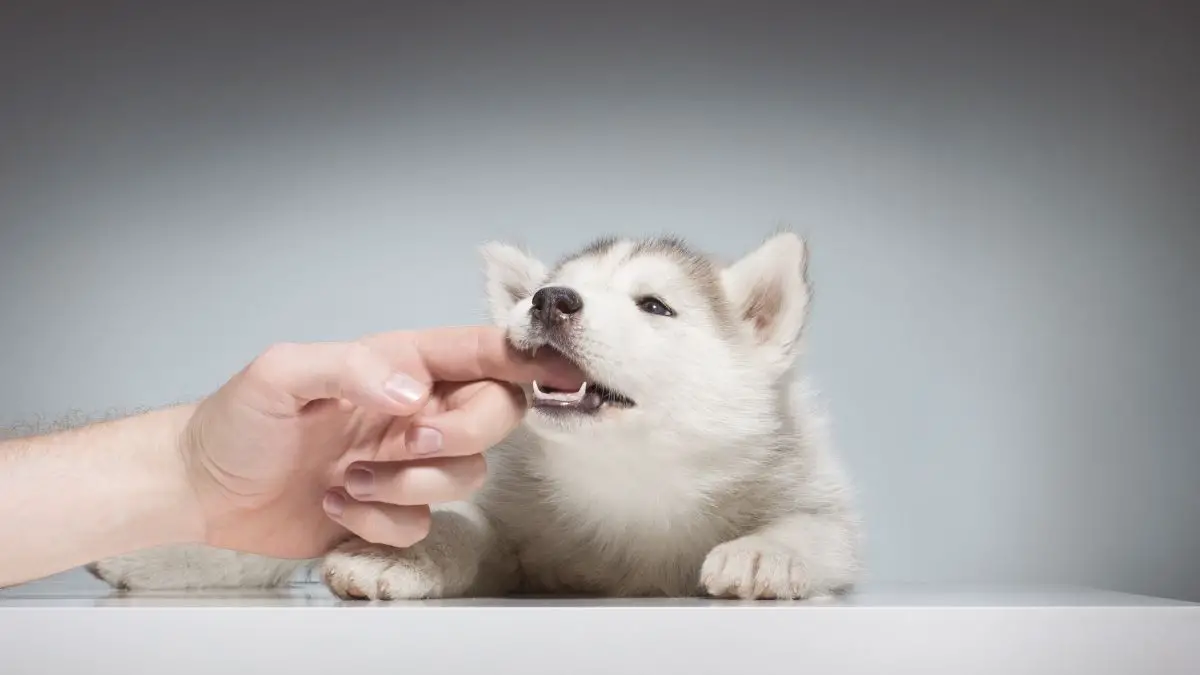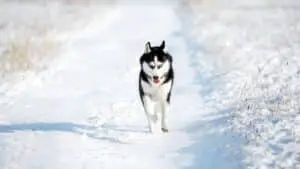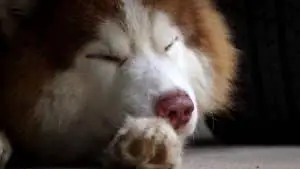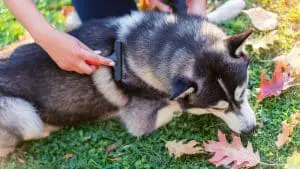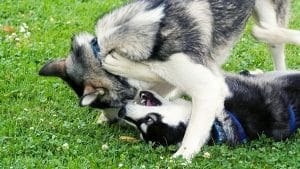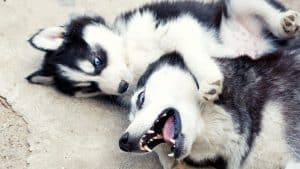Why Does My Puppy Bite Only Me? Things You Should Know
Puppies are adorable, but they’re also huge biters. So when their teeth start developing, you’ll find them gnawing on everything in your home. Nothing is safe from the chewing escapade, especially you!
If your new puppy seems to be latched on to you and chewing constantly, then you’re probably wondering why. After all, you can’t be fond of the teeth marks that seem to be permanently on your skin.
There are a couple of reasons puppies might exhibit this behavior. First, there’s a chance that your puppy sees you as a mother figure (your gender doesn’t matter) and is using you to learn its biting threshold. Second, it could also be because they’re anxious!
Biting needs to be curbed quickly and early on.
Table of Contents
Reasons For Puppy Bites
If you find that your puppy seems to bite you, then there’s a reason behind it. Once you understand the reasoning, it gets easier to curb the behavior.
Sees You As a Mother Figure
Puppies generally teeth or nip at their canine mothers. It is a part of the developmental phase, and the canine mother usually curbs the behavior. If your puppy sees you as a mother figure, they’re more likely to bite only you as a way to learn their biting threshold.
You’ll find this behavior in most puppies that have been taken from their mothers too early.
Mothers usually tell off their pups the minute their biting gets too hard. So when they’re biting you, they’re expecting you to teach them their biting threshold. So, over time, the puppy learns how hard they can bite during play or not bite at all.
Anxiety
Mouthing or biting can be a result of anxiety that you have unknowingly caused your puppy. It may not have been your intention, but certain behaviors can cause stress in your puppy.
Some examples are:
- Holding, snuggling, hugging
- Aggressive or loud tones
- Too much interaction
- Too much energy
According to a study by the Independent, dogs do not feel loved when you show affection by hugging, holding, or snuggling them. It does the opposite and causes anxiety.
Similarly, an article by Argos Pet Insurance outlines the issues caused by spending too much time with a new puppy. Not only will they be more demanding and ill-behaved, but they can lead to extreme attachment and separation anxiety.
Teething Pains
Teething is a natural step in your puppy’s development. The pains caused during the phase aren’t an answer as to why they’re only biting you. However, it could be that they view you as an authority figure and come to you to fix their problems.
Teething causes waves of pain and the only way for pups to get some relief is by chewing. It massages the gums and provides the comfort they’re looking for. Of course, since you’re the authority figure, they’re coming and biting you as a way to find relief.
How Do You Stop Puppies From Biting?
While it is a developmental phase, bite inhibition needs to be taught early on. Letting the behavior carry on unchecked can lead to accidents later.
The Wrong Way
Even with curbing biting, there are specific ways to do it. Unfortunately, the wrong way can do more harm than good to your dog and cause unneeded anxiety. In some cases, improper methods can be downright cruel.
Here are some wrong methods of curbing biting in puppies:
- Holding their mouth shut after the behavior
- Pinning them to the ground on their back to show dominance
- Muzzling them after the undesired behavior
- Punishing or even gently hitting your dog.
Your intention is not to punish your puppy for entirely natural behavior. However, some methods do precisely that. It is important to remember that the biting is not a show of dominance or out of hate; it’s just a phase! The wrong methods are all punishments.
The Right Way
So, if you’re not punishing, then what can you do? Well, you’re doing the exact opposite. As the puppy’s new “mother,” you’ll have to teach them to inhibit biting as well as to curb the behavior. Here are the steps to do both!
Step 1: Let your pup mouth you during play or other times. Make sure the mouthing is soft and not anywhere near painful. When they bite down hard enough to hurt, let out a high-pitched yelp.
Step 2: The yelp or loud sound should’ve taken the pup by surprise. If it doesn’t work, then use a disappointed tone with your pup.
Step 3: Once the puppy stops biting, reward them for their good behavior. If they continue to try and bite you, provide a toy instead.
Step 4: If the toy doesn’t deter the biting, remove yourself from their space. Make sure that your dog’s space is separate from areas like the living room. Delegate a portion of your home to the puppy and encourage play only in this area.
Step 5: Once you’ve left, wait for a minute and then return as if nothing happened.
Step 6: If your pup doesn’t bite anymore, reward them with a treat.
Step 7: Repeat until the mouthing never turns to bite during play and eventually stops!
Why Does It Work?
The right way will often work better and faster than any other method. Punishing your puppy will have short-term results but won’t result in any long-term behavioral changes. On the other hand, the right way takes the neutral approach.
Initially, letting them mouth you and yelping when they bite is mimicking behavior the puppy would have seen with their canine mother. It is usual for canine mothers to yelp, bark, or snap at their pups for biting too hard.
When you mimic the behavior, it’s effectively teaching your puppy bite inhibition. However, when you supplement it by walking away when they keep biting, you’re making them stop their unwanted behavior.
By letting your puppy get bored every time they bite, you’re automatically teaching them that biting equals no playtime. So not only will it be a more significant deterrent to biting but a less cruel way of curbing biting.
Tips To Help
When it comes to curbing lousy behavior in puppies, you’ll need all the reinforcement possible. But when it comes to biting, there are a few tips that can get you through the painful phase.
- Be consistent. Don’t let your pup off the hook even once. When they bite too hard or play too rough, immediately correct the behavior. Either yelp, substitute with a toy, or walk away.
- If your pup continues to run after you to bite at your feet and ankles, instantly stop moving. Stop any stimulation until they back away or grab a toy instead.
- Encourage non-contact play as much as you can. While wrestling is fun, non-contact games like fetch or tug-of-war are better ways to curb biting.
- Try to socialize your puppy more! Let them interact with other dogs and puppies in the area; that way, they’ll learn through observation!
- Any physical punishment (hitting, scruff shaking, etc.) will cause your puppy to bite harder and become aggressive. It will also lead to your puppy becoming scared of you, and you’re going to have a more challenging time bonding with them.
- Don’t forget to reward your puppy when they’re not biting you! Positive rewards are potent.
FAQs
Do Puppies Naturally Stop Biting?
Yes, a puppy’s teething phase starts at 2-3 months and ends at around 7-8 months. While this period differs from dog and depends on the breed, the biting should eventually fade away on its own. However, when a dog is trying to playfully nip you, not having bite inhibition training can cause them to bite harder than you’d expect.
Are Huskies Mouthier Than Other Breeds?
Some breeds tend to be naturally mouthier than others. For example, Siberian Huskies are a breed that tends to be mouthier than most. So, be careful around your Husky and train it! It means that they are more prone to biting, mouthing, and chewing their way through your home.
What If Biting Doesn’t Get Better?
If it doesn’t get better, then you can get professional help. Professionals can tell you where the training has lacked and suggest alternative options to help curb the behavior.
Endnotes
If your puppy is only biting you, then there are a few possible reasons. Either they think you’re a mother figure, they’re anxious, or they’re simply looking for teething relief. With a bit of training and some patience, your puppy will learn to stop biting you completely!

